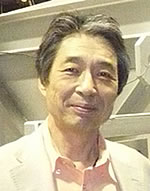Area Director‘s Greeting
Community-Based Actions against Global Warming and Environmental Degradation(FY2008-2013)

Area Director: Masayuki HORIO
Professor, Ryukoku Univ. / Professor Emeritus, Tokyo University of Agriculture and Technology
■Public Needs:
The Great East Japan Earthquake and Fukushima nuclear accidents in March brought an abrupt change in the circumstances surrounding actions against global warming and fossil-fuel-dominant society. Now the unprecedented speed and sureness are required for renewable energy utilization and sustainable local community development, which have been the key elements against global warming and climate change.
With the disasters, the idea that human activities have now reached the near critical level at which they cannot maintain coexistence with the environment further has become more important for restructuring the modern. Among numerous problems having been accumulated so far, one of the most important still is the crisis of global warming and large-scale climate changes. From the start of this Focus Area, we promote R&D projects in science and technology for society that emphasize the development of human and societal scenarios with an aim to achieve a 60-80% reduction in greenhouse gases by the year 2050. We currently have 16 projects underway in Hokkaido, the Tohoku region, the Kanto region, the Chubu region, the Kansai region, the Chugoku region, and on the islands of Shikoku and Kyushu, which generally covers the entire country. These projects are highly motivated by a variety of local-problem-solving that include: urban and rural development through renewable energy utilization and the shift from the fossil-fuel-dominant society; rural remigration through the establishment of rules for self-government and the creation of local industries; revitalization of forestry by urban-rural collaboration; development of new logistics and financial systems to promote the transition to a low co2 emission society; revitalization and creation of local industries by these means. We are also extending our activities to contribute to the restoration of Tohoku area and the society suffering serious damage from the Great East Japan Earthquake.
The greater part of the past R&D activities against global warming has been founded mostly on scientific/engineering scenarios, and has been technocentric in their nature. However, to promote the change of the society toward low co2 emission system, it is necessary to develop humane and social approaches working with people and adopting communicative, institutional and economic methods. The deficiencies associated with the classical R&D approaches should be overcome by adopting the concepts of “science and technology for society” and “on-the-ground perspectives” and by accumulating the collaborative relationship with local people.
■Goals:
1. Research into ways to eliminate global warming and achieve coexistence with the environment is framed in terms of activities to achieve sustainable social systems, based on new concepts that are both comprehensive and laterally integrated. Efforts to scientifically verify the results will be conducted in regional frontline areas. An effort will be made to generalize and systematize research achievements to enable them to be used effectively both at home and abroad.
2. To promote active local communities through redefining the issue in terms of actions against global warming and those for environmental coexistence, existing activities, policies, administrative systems, programs and so on are being organized and analyzed and endogenous and trans-disciplinary plans, techniques for identifying, evaluating and disseminating new values of local communities are developed.
To achieve the goals, we manage this R&D Focus Area and projects with the particular consideration of the following matters:
・Identification of problems from trans-disciplinary, comprehensive, endogenous and productive
view points to turn local communities into complex sustainable systems
・Appropriate cooperation among researchers of humanities and natural science, industry, government,
academia and the general public
・Formulation and implementation of a methodology for nurturing the people who will bear the
construction of sustainable and autonomous local communities
・Development of diverse venues in which local residents and stakeholders can share a
vision of the community’s future





